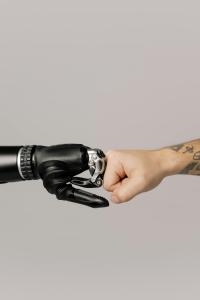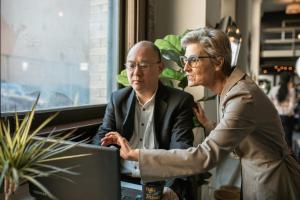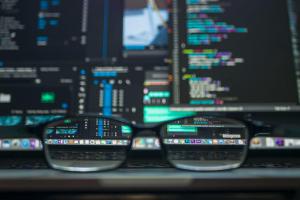AI in Coding, Part 6: The Next 10 Years of Software Development (Smaller Teams, Bigger Impact)
Part 6: Predicting the future of software development over the next decade. How AI will enable smaller teams to deliver bigger impact and transform engineering roles.

The last three years have shown us how fast AI in coding can evolve. Autocomplete became pair programming, pair programming became AI agents, and today’s repos are increasingly touched by AI before they ever reach production. But what does the next decade look like?
If we extend the current trajectory forward, we can see clear signals of where software development is heading and what it will mean for teams, companies, and engineers themselves.
Smaller Teams, Higher Output
In the past, a complex product often required large, specialized teams: frontend engineers, backend engineers, QA testers, DevOps, documentation writers. AI is collapsing many of these roles into workflows that a much smaller group can manage.
- 2–4 engineers with AI support could soon replace teams of 10–15.
- AI will handle boilerplate, scaffolding, routine testing, and even some refactoring.
- Human engineers will focus on architecture, design decisions, and high level problem solving.
This doesn’t mean fewer opportunities for engineers. It means opportunities will shift. The demand will be for engineers who can see the big picture, guide AI effectively, and take responsibility for outcomes.
The Engineer as a Builder
The best developers of the next decade won’t just be coders. They will be builders — people who understand the full software development lifecycle and can orchestrate it end to end with AI assistance.
- Broader ownership: one engineer guiding a product from design to deployment.
- Cross-functional fluency: being able to touch frontend, backend, ops, and testing with AI as support.
- Decision making: knowing when to trust the AI and when to step in.
AI won’t remove the need for CS fundamentals. It will make them more important. Engineers who understand data structures, system design, and software architecture will have the leverage to get the most out of their AI teammates.
AI as a Team Member
Today, we talk about AI tools. In the future, companies will talk about AI team members.
- An “AI DevOps specialist” that monitors logs, applies fixes, and files issues.
- An “AI QA engineer” that continuously generates and runs tests.
- An “AI technical writer” that maintains up to date documentation.
These won’t replace human specialists in critical cases, but they will take on 70–80% of the repetitive work, freeing people to work on strategy, compliance, and innovation.
Organizational Impact
Companies will need to rethink how they structure teams and manage software delivery.
- Smaller, cross-functional teams will become the norm.
- Project timelines will shrink as backlog execution becomes faster.
- Recruiting priorities will shift from deep specialization to versatile engineers with strong fundamentals and product sense.
- Governance and accountability will become critical: who is responsible when AI-generated code introduces a security issue?
Skills That Will Matter Most
If you want to future-proof your career, the skills to invest in over the next decade are clear:
- System architecture – designing robust, scalable systems.
- AI literacy – knowing how to prompt, guide, and supervise AI effectively.
- Security awareness – catching vulnerabilities AI introduces.
- Domain expertise – applying technology in specific industries like finance, healthcare, or logistics.
- Collaboration and product thinking – seeing beyond code to user outcomes.
A Glimpse of 2035
By 2035, it is not unrealistic to imagine startups with fewer than 10 people competing with today’s mid-size tech companies. With AI shouldering much of the routine work, innovation cycles will be faster, costs will be lower, and the bottleneck will shift from building software to defining what’s worth building.
✅ Key Takeaway
In the next 10 years, software engineering won’t be about typing faster. It will be about thinking bigger. Smaller teams will deliver more, and the most valuable engineers will be those who can guide AI, own broader parts of the lifecycle, and align technology with business outcomes.
This article is part of my series “AI in Coding – From Past to Future.”
🎥 Watch the Full Lecture
For a deeper dive into this topic, watch my complete presentation on AI in software development:
Note: The introduction is in Bosnian, but the main lecture is in English and starts around the 3-minute mark.
This lecture covers all the topics in this series and provides additional insights and Q&A.
Full Series:
- Part 1: From Lisp to Copilot: The Evolution of AI in Software Development
- Part 2: AI Tools Every Engineer Should Know in 2025
- Part 3: Best Practices for Working with Your New Junior Developer
- Part 4: I Let AI Build BigToFit.com During My Lecture
- Part 5: How Far We’ve Come in Just 3 Years
- Part 6: The Next 10 Years of Software Development (this post)
- Part 7: Will AI Replace Programmers? (Coming October 20)
- Part 8: Future-Proofing Your Career (Coming October 23)
How do you see your role as an engineer evolving over the next decade? Are you preparing for the shift from specialist to builder? I’d love to hear your thoughts on what skills you’re focusing on for the AI assisted future.

Irhad Babic
Practical insights on engineering management, AI applications, and product building from a hands-on engineering leader and manager.


